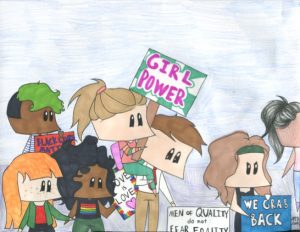By Madison Kitch

The term “woke” is past tense for the word “wake,” but it’s come to mean so much more in recent years. According to the Austin’s NPR radio station, the art of being “woke” is “to be aware of and actively attentive to important facts and issues.”
The new use for the term first appeared on social media in 2013 after the tragic death of unarmed African-American teenager Trayvon Martin. Outrage sparked on social media after Martin’s untimely death, with the hashtag #BlackLivesMatter being used to express anger and frustration over the situation. This is where the term “woke” first began to gain popularity, and has had a huge impact on American culture since.
America is very divided right now, and for a movement that has good intentions, wokeness gets a bad name. When most people hear the word “woke,” they think of self-righteous, over-sensitive college kids marching in the street, using too many hashtags in their tweets. “Wokeness” is commonly associated with liberal viewpoints, but it simply means being conscious, aware and knowledgeable about the issues of today’s society. In reality, being aware of what’s going on is not a bad thing.
On the other hand, “fake-woke” people proclaim their advocacy and how progressive they are on social media, yet they never take real action in person by participating in local marches or calling out ignorance in their daily lives. “Fake-wokeness” disrupts woke causes and removes the attention from minorities that face real issues. Being proud of yourself is one thing, but bragging about how great you are without doing any work does more harm than good.
Many people have a general understanding of what’s going on around them, but they aren’t sure how to truly become woke. You may know the basics of being polite, but in this day and age, the basics aren’t enough. Wanting to be woke is the first step because it means that you care. Whatever your reason for wanting to be woke may be, don’t lose sight of it during the process.
1) Research
Most Clark County students have developed research skills at some point in their school careers, but now is finally a time to put it to good use. Researching is just as important as any other step on this list, but it will feel tedious. In reality, research never truly ends. New studies about racism, sexuality, and gender are always being updated, so there’s always something new to learn.
While people can relay true facts on social media, it’s definitely best to do your own work on this one. For every factual tweet, there’s three that aren’t, so it’s best to use credible sources. Here are some good websites to start with:
- www.wokeup.us/ (When subscribed to their email service, they can put you in contact with local volunteer organizations and other activists.)
- https://www.ted.com/talks (Delivers short talks about a variety of different topics to educate yourself.)
- http://bcrw.barnard.edu/home/about/ (Under the “Publications” tab, they have a variety of resources for information such as podcasts and newsletters.)
- https://www.cnn.com/world (Reliable news source that reports on world news and U.S. news. They also have a daily segment geared towards teens called CNN 10.)
2) Don’t bandwagon
Form your own opinion without the input from others. While it can be hard to be completely unbiased, immediately going to Twitter and reading other people’s opinions will only influence yours before it should. It’s okay to agree with the general public, but before you do that, make sure it’s really your opinion.
3) Be open-minded
Know what you believe first. Then, be open to what other people think. After all, there’s at least two sides to every story, and having a good knowledge of more than one will give you a better understanding of the situation. Exposing yourself to other viewpoints and trying to understand all sides will only develop your own perspective. While it’s difficult to find a completely unbiased news source, one site that shows both sides of a story well is The New York Times. Some other relatively unbiased sources are:
Part of being woke is knowing you might be wrong, but that’s okay. Being woke is a continuous learning process.
4) Listen
Listen to the experiences of minorities and acknowledge them. Hand the microphone to minorities and give them the platform to speak about their lives. An ally is someone that may not necessarily be a minority but still wants to support the cause. Allies can help minorities by changing the system from which they benefit. By listening to others and listening to people who are brave enough to share their experiences, it’s possible to become an ally and make the world a better place.
By following these steps, you can help yourself and your community become more compassionate. At the end of the day, empathy is the most important thing. If we can’t empathize with others, the world will never improve. By following this guide, not only will you walk the path to being woke– you’ll strut.











